- Home
- Wilkie Collins
The Two Destinies Page 18
The Two Destinies Read online
Page 18
her eyes. She stood, leaning one hand on the table, confusedand irresolute, her firm and supple figure falling into an attitudeof unsought grace which it was literally a luxury to look at. I saidnothing; my eyes confessed my admiration; the writing materials layuntouched before me on the table. How long the silence might havelasted I cannot say. She abruptly broke it. Her instinct warned her thatsilence might have its dangers, in our position. She turned to me withan effort; she said, uneasily, "I don't think you ought to write yourletter to-night, sir."
"Why not?"
"You know nothing of me. Surely you ought not to recommend a person whois a stranger to you? And I am worse than a stranger. I am a miserablewretch who has tried to commit a great sin--I have tried to destroymyself. Perhaps the misery I was in might be some excuse for me, if youknew it. You ought to know it. But it's so late to-night, and I am sosadly tired--and there are some things, sir, which it is not easy for awoman to speak of in the presence of a man."
Her head sunk on her bosom; her delicate lips trembled a little; shesaid no more. The way to reassure and console her lay plainly enoughbefore me, if I chose to take it. Without stopping to think, I took it.
Reminding her that she had herself proposed writing to me when we metthat evening, I suggested that she should wait to tell the sad story ofher troubles until it was convenient to her to send me the narrativein the form of a letter. "In the mean time," I added, "I have the mostperfect confidence in you; and I beg as a favor that you will let me putit to the proof. I can introduce you to a dressmaker in London who is atthe head of a large establishment, and I will do it before I leave youto-night."
I dipped my pen in the ink as I said the words. Let me confess franklythe lengths to which my infatuation led me. The dressmaker to whom Ihad alluded had been my mother's maid in f ormer years, and had beenestablished in business with money lent by my late step-father, Mr.Germaine. I used both their names without scruple; and I wrote myrecommendation in terms which the best of living women and the ablest ofexisting dressmakers could never have hoped to merit. Will anybody findexcuses for me? Those rare persons who have been in love, and who havenot completely forgotten it yet, may perhaps find excuses for me. Itmatters little; I don't deserve them.
I handed her the open letter to read.
She blushed delightfully; she cast one tenderly grateful look at me,which I remembered but too well for many and many an after-day. The nextmoment, to my astonishment, this changeable creature changed again. Someforgotten consideration seemed to have occurred to her. She turned pale;the soft lines of pleasure in her face hardened, little by little; sheregarded me with the saddest look of confusion and distress. Putting theletter down before me on the table, she said, timidly:
"Would you mind adding a postscript, sir?"
I suppressed all appearance of surprise as well as I could, and took upthe pen again.
"Would you please say," she went on, "that I am only to be taken ontrial, at first? I am not to be engaged for more"--her voice sunk lowerand lower, so that I could barely hear the next words--"for more thanthree months, certain."
It was not in human nature--perhaps I ought to say it was not in thenature of a man who was in my situation--to refrain from showing somecuriosity, on being asked to supplement a letter of recommendation bysuch a postscript as this.
"Have you some other employment in prospect?" I asked.
"None," she answered, with her head down, and her eyes avoiding mine.
An unworthy doubt of her--the mean offspring of jealousy--found its wayinto my mind.
"Have you some absent friend," I went on, "who is likely to prove abetter friend than I am, if you only give him time?"
She lifted her noble head. Her grand, guileless gray eyes rested on mewith a look of patient reproach.
"I have not got a friend in the world," she said. "For God's sake, askme no more questions to-night!"
I rose and gave her the letter once more--with the postscript added, inher own words.
We stood together by the table; we looked at each other in a momentarysilence.
"How can I thank you?" she murmured, softly. "Oh, sir, I will indeed beworthy of the confidence that you have shown in me!" Her eyes moistened;her variable color came and went; her dress heaved softly over thelovely outline of her bosom. I don't believe the man lives who couldhave resisted her at that moment. I lost all power of restraint;I caught her in my arms; I whispered, "I love you!" I kissed herpassionately. For a moment she lay helpless and trembling on my breast;for a moment her fragrant lips softly returned the kiss. In an instantmore it was over. She tore herself away with a shudder that shookher from head to foot, and threw the letter that I had given to herindignantly at my feet.
"How dare you take advantage of me! How dare you touch me!" she said."Take your letter back, sir; I refuse to receive it; I will never speakto you again. You don't know what you have done. You don't know howdeeply you have wounded me. Oh!" she cried, throwing herself in despairon a sofa that stood near her, "shall I ever recover my self-respect?shall I ever forgive myself for what I have done to-night?"
I implored her pardon; I assured her of my repentance and regret inwords which did really come from my heart. The violence of her agitationmore than distressed me--I was really alarmed by it.
She composed herself after a while. She rose to her feet with modestdignity, and silently held out her hand in token that my repentance wasaccepted.
"You will give me time for atonement?" I pleaded. "You will not lose allconfidence in me? Let me see you again, if it is only to show that I amnot quite unworthy of your pardon--at your own time; in the presence ofanother person, if you like."
"I will write to you," she said.
"To-morrow?"
"To-morrow."
I took up the letter of recommendation from the floor.
"Make your goodness to me complete," I said. "Don't mortify me byrefusing to take my letter."
"I will take your letter," she answered, quietly. "Thank you for writingit. Leave me now, please. Good-night."
I left her, pale and sad, with my letter in her hand. I left her, withmy mind in a tumult of contending emotions, which gradually resolvedthemselves into two master-feelings as I walked on: Love, that adoredher more fervently than ever; and Hope, that set the prospect before meof seeing her again on the next day.
CHAPTER XII. THE DISASTERS OF MRS. VAN BRANDT.
A MAN who passes his evening as I had passed mine, may go to bedafterward if he has nothing better to do. But he must not rank amongthe number of his reasonable anticipations the expectation of gettinga night's rest. The morning was well advanced, and the hotel was astir,before I at last closed my eyes in slumber. When I awoke, my watchinformed me that it was close on noon.
I rang the bell. My servant appeared with a letter in his hand. It hadbeen left for me, three hours since, by a lady who had driven to thehotel door in a carriage, and had then driven away again. The man hadfound me sleeping when he entered my bed-chamber, and, having receivedno orders to wake me overnight, had left the letter on the sitting-roomtable until he heard my bell.
Easily guessing who my correspondent was, I opened the letter. Aninclosure fell out of it--to which, for the moment, I paid no attention.I turned eagerly to the first lines. They announced that the writerhad escaped me for the second time: early that morning she had leftEdinburgh. The paper inclosed proved to be my letter of introduction tothe dressmaker returned to me.
I was more than angry with her--I felt her second flight from me as adownright outrage. In five minutes I had hurried on my clothes and wason my way to the inn in the Canongate as fast as a horse could draw me.
The servants could give me no information. Her escape had been effectedwithout their knowledge.
The landlady, to whom I next addressed myself, deliberately declined toassist me in any way whatever.
"I have given the lady my promise," said this obstinate person, "toanswer not one word to any question that you may ask me about he
r. Inmy belief, she is acting as becomes an honest woman in removing herselffrom any further communication with you. I saw you through the keyholelast night, sir. I wish you good-morning."
Returning to my hotel, I left no attempt to discover her untried. Itraced the coachman who had driven her. He had set her down at a shop,and had then been dismissed. I questioned the shop-keeper. He rememberedthat he had sold some articles of linen to a lady with her veil down anda traveling-bag in her hand, and he remembered no more. I circulated adescription of her in the different coach offices. Three "elegant youngladies, with their veils down, and with traveling-bags in their hands,"answered to the description; and which of the three was the fugitiveof whom I was in search, it was impossible to discover. In the days ofrailways and electric

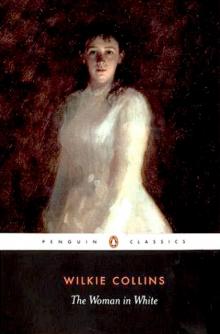 The Woman in White
The Woman in White The Queen of Hearts
The Queen of Hearts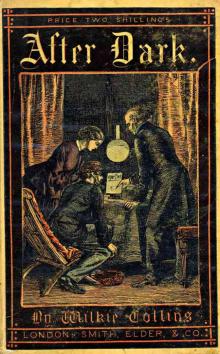 Miss Jeromette and the Clergyman
Miss Jeromette and the Clergyman Man and Wife
Man and Wife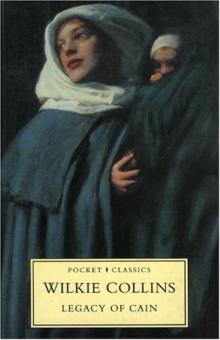 The Legacy of Cain
The Legacy of Cain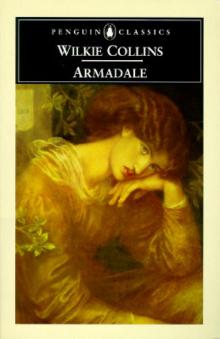 Armadale
Armadale The Frozen Deep
The Frozen Deep John Jago's Ghost or the Dead Alive
John Jago's Ghost or the Dead Alive Poor Miss Finch
Poor Miss Finch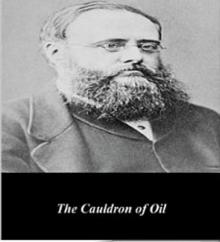 The Cauldron of Oil: A Case Worth Looking At
The Cauldron of Oil: A Case Worth Looking At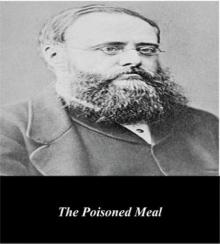 The Poisoned Meal
The Poisoned Meal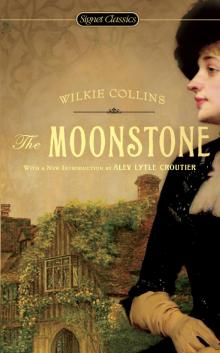 The Moonstone
The Moonstone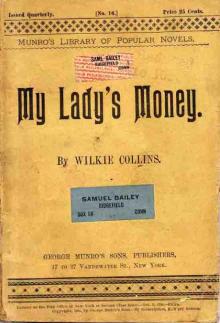 My Lady's Money
My Lady's Money Classic Ghost Stories
Classic Ghost Stories Jezebel's Daughter
Jezebel's Daughter The Devil's Spectacles
The Devil's Spectacles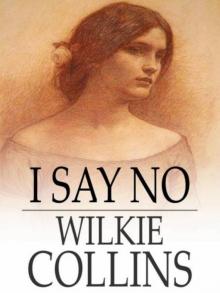 I Say No
I Say No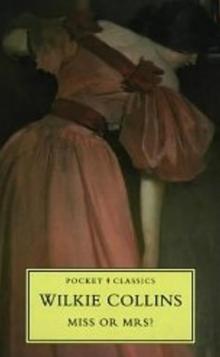 Miss or Mrs.?
Miss or Mrs.?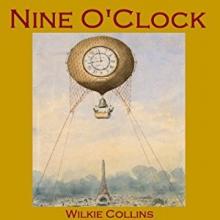 Nine O'Clock
Nine O'Clock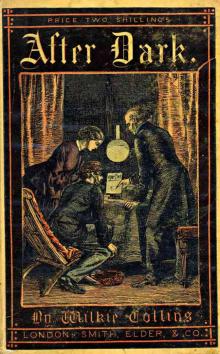 The Lawyer's Story of a Stolen Letter
The Lawyer's Story of a Stolen Letter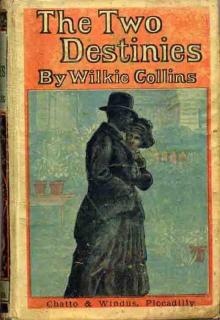 The Two Destinies
The Two Destinies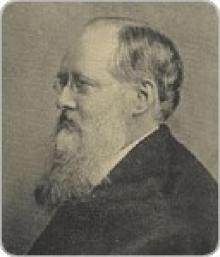 Mr. Percy and the Prophet
Mr. Percy and the Prophet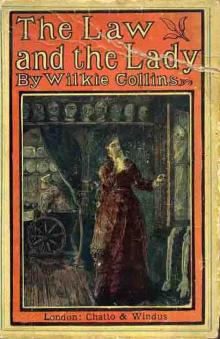 The Law and the Lady
The Law and the Lady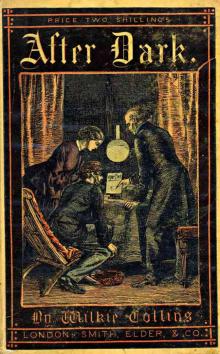 The Nun's Story of Gabriel's Marriage
The Nun's Story of Gabriel's Marriage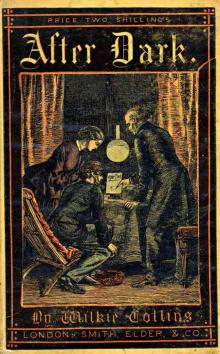 After Dark
After Dark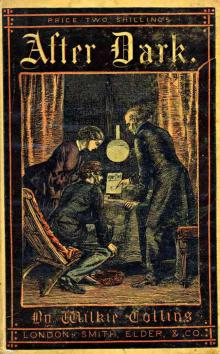 Mr. Captain and the Nymph
Mr. Captain and the Nymph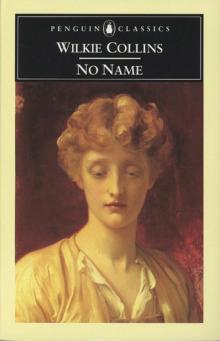 No Name
No Name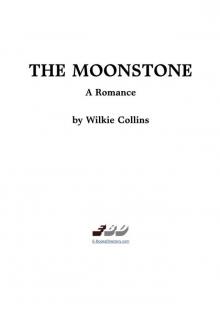 The Moonstone (Penguin Classics)
The Moonstone (Penguin Classics) Antonina
Antonina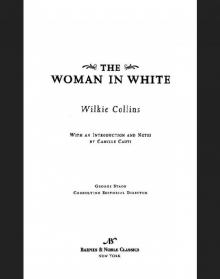 Woman in White (Barnes & Noble Classics Series)
Woman in White (Barnes & Noble Classics Series)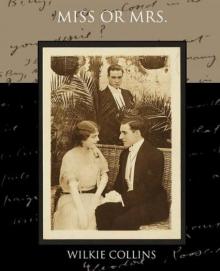 Miss or Mrs
Miss or Mrs The Dead Alive
The Dead Alive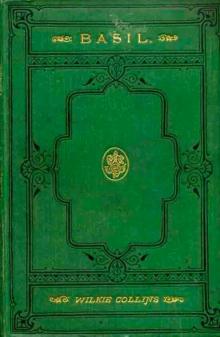 Basil
Basil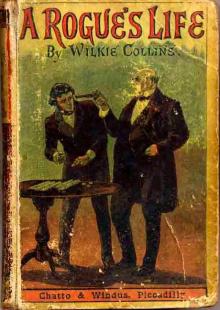 A Rogue's Life
A Rogue's Life The New Magdalen
The New Magdalen Blind Love
Blind Love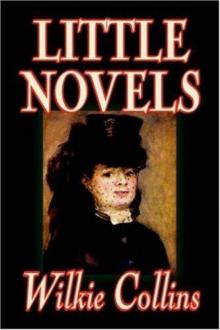 Little Novels
Little Novels The Lazy Tour of Two Idle Apprentices
The Lazy Tour of Two Idle Apprentices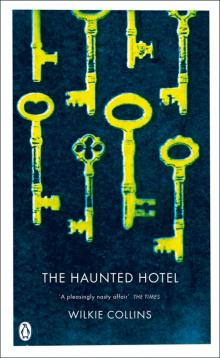 The Haunted Hotel
The Haunted Hotel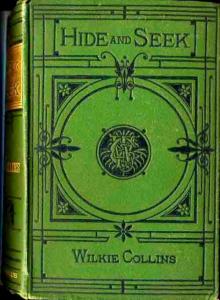 Hide and Seek
Hide and Seek